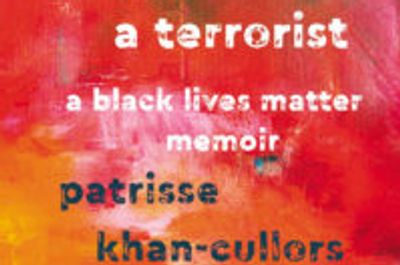By Terri Schlichenmeyer, July 2018 Issue.
You can’t look any longer. Whatever it is, it’s just too painful, too scary, so you hide your eyes and pretend that nothing’s happening. You can’t look any longer, so you don’t… but after awhile, you notice it again.
That’s when you realize that you saw all along. That’s when, as in the new book When They Call You a Terrorist: A Black Lives Matter Memoir by Patrisse Khan-Cullors and Asha Bandele, you realize that you never really could look away.
Patrisse Khan-Cullors and Asha Bandele, with a foreword by Angela Davis. St. Martin’s Press, 2017 | $24.99.
Growing up as the third child in a family of four, Patrisse Khan-Cullors lived with her mother and siblings in a “multiracial” neighborhood near Sherman Oaks, California. The two places were “less than a mile” apart but, due to social, financial and racial divides, they were separated by oceans, in Khan-Cullors’ mind.
Despite the fact that her mother worked all day and into the night, Khan-Cullors was reared in a loving atmosphere. The man who raised her wasn’t always around, but she adored him; after she learned, at age 12, that he wasn’t her biological father, her birth-father and his family became present on a regular basis. Absent an adult, Khan-Cullors’ eldest brother acted as “man” of the house. This all complicated her young life, but she enjoyed this expanded, supportive family.
Khan-Cullors says that she was 12 years old, the first time she was arrested. By then, she’d witnessed her brothers being questioned by police for just hanging out with friends. She started truly noticing her surroundings.
Not long afterward, her father was imprisoned on drug charges, and she lost touch with much of his family. Then her older brother was imprisoned for attempted burglary and was diagnosed with a mental health disorder, and Khan-Cullors came to understand that she was queer. She began to earnestly question things in her life.At 16, she became an “organizer’ and an activist. She doubled down on it after her brother was arrested and called a “terrorist” for yelling at a woman. She was driven to act when, following the death of Trayvon Martin and the acquittal of George Zimmerman, she sent out a message to her friends. #BlackLivesMatter.
“I write,” she says, “I hope it impacts more than we can ever imagine.”
And, of course, it did, and it will. Once you’re finished with When They Call You a Terrorist: A Black Lives Matter Memoir you’ll want to stand up, too.
You’ll want to stand, even though Khan-Cullors (with Bandele) doesn’t tell stories here that haven’t already been told before. Indeed, many authors have shared similar tales of poverty, affluent white friends, outrage, prison and sadness. The shelves are full of such books – but this one is different because Khan-Cullors gives her story an urgent hear-me-now outrage. That “done playing” feeling is what readers may come away with – a feeling that underscores Khan-Cullors’ activism.
And that’s what this book is about: it’s a rallying cry wrapped in a memoir tied in a call to legal action of whatever sort. And so, if you’re ready, When They Call You a Terrorist: A Black Lives Matter Memoir is worth a longer look.
